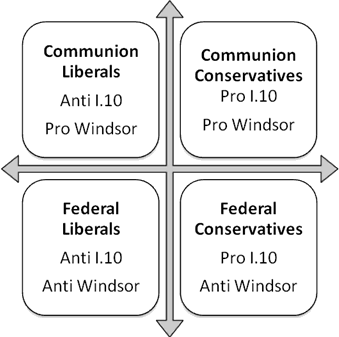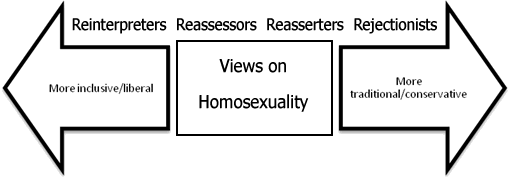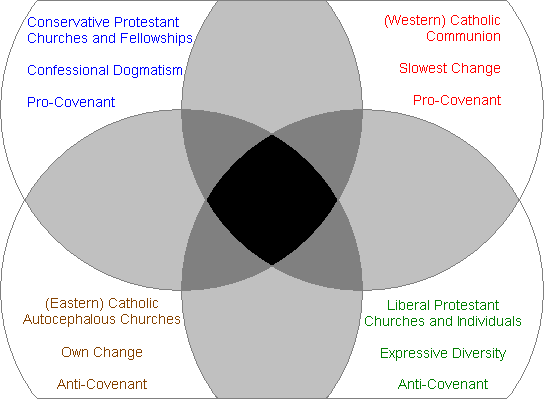
| In December 2007 Andrew Goddard produced an updated taxonomy of the Anglican Communion. Disputes between national Churches from the Global South consecrating dogmatic, selective literalist or traditionalist bishops to work in areas in opposition to their national Churches that are deemed too inclusive for gay people, in having same sex blessings and consecrating a man in a gay relationship, are leading to potential structural division. The gay issue is seen by the biblical selective literalists as a first order doctrinal question, and they tend to go on to accuse the inclusive Churches of further doctrinal laxity. |
| Anglicanism follows a geographical principle, as do other Catholic Churches, with one diocesan bishop cohering assistant bishops, priests, deacons and people in one area. So if another Anglican Church starts organising in that area, then it is rather like Roman Catholics and Orthodox being present in that area too. This is why, so far, those bishops who are carrying out incursions are not recognised by the Anglican Communion. |
| Anglicanism is also Reformed, or Protestant, so rather than being the Catholic Church in one area, a Reformed view is that Churches gather the believing faithful. |
| It is important to realise that both Catholics and Protestants have liberal (or flexible) as well as dogmatic approaches to doctrine and belief. For Catholics, it depends on what historic Councils are recognised, and also the view is that grace is given through the sacraments and therefore belief can be flexible (this applies to sacraments being valid even if the priest is heretical and laity simply receive whatever they may believe). For Protestants, the Reformation went in various directions (such as Socinianism and Unitarianism in Poland and Transylvania respectively - and Hungary for a while, and influencing the Netherlands more permanently), plus dependency on the Bible led, via German criticism, to a more flexible approach to what exists in the Scriptures. Anglicanism is not supposed to contradict the scriptures, which is rather problematic when the Scriptures contradict the Scriptures. |
| There are continuing Anglicanisms and Anglicanism makes up a feature, in both apostolic succession and prayer books practice, of the Independent Sacramental Movement. However, the issue of division is affecting the Anglican Communion under its titular head of the Archbishop of Canterbury. It is this that is divided against itself. |
| Homosexuality is the presenting issue, for which evangelicals claim there is no biblical ambiguity, unlike for the ordination of women (restriction on headship is more clear). Liberals say that Paul was preaching against sexual immorality and had no concept of faithful homosexual relationships (and he rather regarded marriage as a second rate "if you must" container of sexual sin to that of abstinence ahead of the coming Kingdom of God). |
| The homosexuality issue has been extended to issues about biblical authority. Whilst Western Anglicanism more or less has treated the homosexuality issue rather like the ordination of women issue, the response from the Global South has been rather more fierce, giving an opportunity for Western selective literalists to make an alliance with people of unsympathetic religious cultures, and to organise resistance. |
| An argumentative and forced into place resolution of the Lambeth Conference 1998, known as Lambeth 1:10, has become the touchstone of the selective literalists. They tend to ignore the "listening process" aspect of homosexual relationship witness, and stress its rejection of active gay relationships in ministry. That The Episcopal Church consecrated an actively gay relationship bishop in 2003 has led to targeting that Church for disciplining and exclusion, in the opinion of the selective literalists, although incursions took place by Africans before 2003. It intensified afterwards. |
| To dampen down the controversy, and prevent a division, a Catholic view was used by the Archbishop of Canterbury whereby contentious issues could be dealt with internationally, using the four Instruments of Communion: the Archbishop of Canterbury, the Lambeth Conference, the Anglican Consultative Council and the Primates' Meeting. Thus whilst change is possible it would be via consensus across the Communion. The trouble is that national Churches are autonomous and each has its own Canon Law. |
| To make a Communion response more formal, the Windsor Process was launched by Rowan Williams, Archbishop of Canterbury, which is to bring a sense of unity via a Covenant document. With the Covenant, Churches that wish to innovate and then fell into dispute with other Churches, would meet among the Communion and, basically, argue its theology. The likely outcome is going the speed of change of the slowest. This, then, is Catholic, in that it allows for change if all agree, whereas a Protestant based meeting would be beliefs as fixed. In the Protestant case, there is no prospect of change, unless beliefs change. |
| Producing a new centre of decision making is effectively Western Catholic, along an adapted Roman Catholic model. The danger is that the Primates (the most active in responding) end up as a Curia, and there has been talk of the national Anglican Churches being sidelined, with the diocese and its bishop of an Anglican Church then coming under the Archbishop of Canterbbury. This is absolutely not the case now: it is the national Churches that have made the dioceses, and who provide their own hierarchy. |
| Such a Western centralised model working directly to the Archbishop of Canterbury produces, in effect, taken to its logical conclusion, a new Church. |
| Protestants might merge actual Churches, or show networks of agreements around signed documents - indeed a narrow, doctrinal Covenant would be such a document for them, and would bind Churches in and submit them to sanction, as well as exclude (and thus give legitimacy to Churches going overseas to reorganise a geograhical area). |
| It is important to realise that evangelicals both support and reject a Covenant. They support it because it would state doctrine and be a means of discipline of the heretical. They oppose it because a Catholic Covenant would not be about doctrine but would be about process. Catholics tend to support a Covenant, unless their Catholicism follows an Eastern model focusing on national Churches. |
| Easter Catholicism has a view of Churches as autocephalous, that is each Church operates under its own hierarchy and chooses its own ecumenical relationships - and this happens throughout Orthodoxy.The argument goes that Anglicanism, with its autonomous Churches, is similar. |
| Liberals accept the Covenant idea if based on the 1886 Lambeth Quadrilateral as a well worn historical document (Holy Scripture as the rule of faith; the Apostles' and the Nicene creeds; the sacraments of Baptism and the Lord's Supper; and the historic episcopate), stresses baptism and communion (liberal Catholics), and reflects theological diversity (both Catholic and Protestant liberals). Such a Covenant would be opposite to a doctrinal one, and would hardly seem to be necessary. |
| Liberals also oppose the Covenant because it is intended to restrict belief and/ or slow innovation, and misunderstands unity as uniformity, and because it centralises when they want to decentralise. |
| The Covenant (that may take until 2012 to finalise, if it ever does) cannot satisfy all parties, either Catholic or Protestant, dogmatic or liberal. The general support for it so far simply has to decline as it fails to restrict or starts to restrict, fails to slow or starts to slow. |
|
In trying to understand the Anglican dispute in 2007, Andrew Goddard, who would be described as an Open Evangelical, has altered his earlier simpler taxonomy. He wanted to make the issue of homosexuality semi detached from commitment and thus to make it more flexible and nuanced.
http://www.fulcrum-anglican.org.uk/page.cfm?ID=250 |

| The original four squares (above) took no account of Catholic or Reformed as key concepts, simply whether the position held is Communion or Federal based, Conservative or Liberal. It was then a case of matching groups to one of the four ideal types, and describing views on homosexuality. Fulcrum is Communion Conservative, Reform is Federal Conservative (because it supports international intervention: it would claim its is as much Communion reforming), InclusiveChurch was Communion Liberal, the Modern Churchpeoples Union was Federal Liberal. But what would be the position of a group that opposed a process Covenant and yet was otherwise pro-Communion? The Church Society opposes the Covenant on the grounds it is not intended to be biblically doctrinal nor based on the thirty-nine Articles, but would allow change. |
| Before suggesting a fuller view, and yet as economical, there is his semi-detaching of views about homosexuality. |

| He now runs a scheme from rejectionists, who are basically homophobic, to reasserters, who emphasise selective literal texts on excluding sexual homosexual relationships from Christianity, to reassessors who may change slowly, and then reinterpreters who use the more social and cultural argument about applying what New Testament people and less so the Old Testament said about homosexuality. |
| In that this has to be considered separately at all, rejectionists (who'd focus on homosexuality - homophobes perhaps) are able to write in a disguised fashion and just follow reasserting methods. As the two affect outcomes in the same way, they can be grouped together. Really, then, the views held about sexuality parallel views held about selective literalism as a basis of biblical authority. This is how evangelicals will justify their homosexuality views, but also it must mean a rejection of selective literalism to begin to be progressive regarding inclusion in ministry and for blessing same sex relationships. One is either progressive, middling or against, and so this falls in with comparative views about the Bible, and does so comparatively with other sources of authority, such as tradition and the reasoning individual. So, if important at all, only three categories count, and they become justified according to sources of Christian authority. |
|
He emphasises a point in his review of criticism, at http://www.ajgoddard.net/webdocs/anglican/mapping.pdf , that reasserters can reject Windsor too. (page 6) |
| In that document a good point is made that the Lambeth 1:10 position is compatible with reasserting and even reassessing (because of the potential outcome of listening to gay experience), and that it received the support it did because it is not just a rejectionist motion. |
| Andrew Goddard's reduction of categories of stance towards the Windsor Process to three - the more important categories - is too restricive. Whilst Communion Catholicism, Connectional Confessionalism and Autonomous Inclusivism are roughly right, the last category does have two groups lumped together. |
| There are inclusivists who are more Catholic and locate the Catholicism in the Churches but still find the Communion important and recognise the importance of the linkage it offers. They would be in favour of the Covenant, so long as the Covenant expressed the autonomy in the Communion and diversity where potential change can be made actual. One Church may innovate and be able to able to test the innovation on behalf of others. Nevertheless a liberal Catholicism is going to be more Eastern (or indeed Anglican!) and the Communion remains a "bonds of affection" Communion. It would be for Churches to recognise mutual ministries, as they do now (for example women bishops in some Anglican Churches are not recognised sacramentally in others). Each Primate is important in his or her own domain and not in a central locale where they only have discussions, again on an existing Anglican understanding. |
| However, there are also inclusivists who see diversity and authority between and within Churches, and it comes down to the communities and individuals. They think the Covenant is a waste of time - of course there is a Communion, but it is just loose. One Church simply cannot function according to anothers cultural framework. These then are liberal Protestants by and large. They of course see connections between Churches where a more diverse theology has made a bigger impact - there are Churches more liberal than others, and may form closer ties just as might those that are more doctrinal - but it is up to the locals in every case. |
| So I have produced a diagram. |

| It refers not to pro or anti Windsor, as people can still participate in the process, even if at the end they are likely to reject a Covenant that is to do a job of making innovation something to be moderated by the Communion. This is what the Covenant is for - it is not to just reiterate existing Anglican documents. |
| The size of the circles are identical and so are the overlaps in each case for two or three circles, so there is no indication of the sizes of constituencies (cropping is just for space). They are simply spaces in which any individual may be located and positioned. Having tested a number of shapes and overlaps, there is no satisfactory summary diagram other than an equality of shapes. That there is more overlap with circles than pure position is perhaps realistic. |
| Of course the mapper develops the map according to use from the place where the mapper resides. It should apply generally, but the places of interest and emphases will be according to the individual. My use of Eastern and Western is partly clouded by local conversation and by my encounter with the Independent Sacramental Movement - so I am using Eastern terminology whereas Anglicans might use Anglican terminology (but this Anglican terminology for autonomy is increasingly unclear and creates confusion as so many Anglicans question this basis of the institutions). I also approach this as a liberal and so give more emphasis to the liberal side - but my assumption is that the Covenant is to restrict, to moderate and to centralise in this Communion. There may be a case for some liberals to make a Covenant in a post-split Communion in which emphasis on diversity via interpreting historical documents can be made. |
Adrian Worsfold
Pluralist - Liberal and Thoughtful